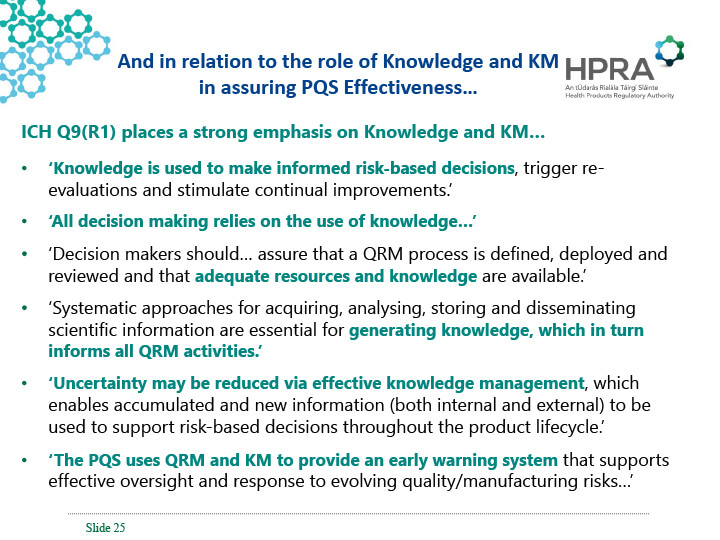Advancing the Industry Dialogue on KM in Support of PQS Effectiveness
 PDA Knowledge Management (KM) Roadmap Team has been discussing how KM and PDA can uniquely add value to understanding and applying
KM in manufacturing, quality and compliance, with the goal of developing a roadmap to build improved KM competency for the industry over the next several years.
PDA Knowledge Management (KM) Roadmap Team has been discussing how KM and PDA can uniquely add value to understanding and applying
KM in manufacturing, quality and compliance, with the goal of developing a roadmap to build improved KM competency for the industry over the next several years.
The intent has not been to create a new, distinctive “flavor” of KM, but rather to build on existing work and explore how KM can facilitate pharmaceutical quality system (PQS) effectiveness and decision-making.
Part of the team’s work in creating a roadmap has been identifying deliverables and learning opportunities for PDA and its members. Instead of immediately recommending a technical report on KM, the team is looking for opportunities to develop a common, consistent understanding of what knowledge management includes and its benefits for the pharmaceutical industry and the patients who depend on the industry via learning events, existing publications and more. A preliminary roadmap to advance KM's understanding and competency in the industry has been shared with the PDA Regulatory Affairs Quality Advisory Board. Further details are being added to aid its implementation over the next few years.
Several sources of information have significantly contributed to the KM roadmap. A survey was conducted of PDA members with 160 respondents that provided a high-level snapshot of how KM was being viewed and applied. Team members did a literature review looking at how KM was being used in the pharma industry (as well as in other industries and endeavors). The ensuing results were discussed amongst the team to increase shared understanding.
Importantly, the revision of the International Council for Harmonisation (ICH) guideline on quality risk management (QRM), Q9 (R1), expanded on the importance of the relationship between KM and QRM. Kevin O’Donnell of the Irish Health Products Regulatory Authority (HPRA) and the rapporteur of the ICH Q9(R1) Expert Working Group, in his presentation at the September 2024 PDA/FDA Joint Regulatory Conference, summarized the importance of knowledge and KM to the revised QRM guidance and overall PQS effectiveness (see Figure 1). Several other presentations at the September meeting either focused or emphasized KM.

With the increased visibility of KM and organizations becoming more attuned to what KM can do – and is expected to do as established in various industry and regulatory guidance – the team has produced several findings on the current state of KM in pharma. This includes:
- The undeniable need for KM to support product quality as stated or implied in publications from the ICH, the European Medicines Agency, World Health Organization and U.S. Food and Drug Administration.
- A heightened interest in KM by the industry but often lacking clarity of how KM can be made practical or tangible.
- Recent research that highlights KM’s central importance to improve risk-based decision-making.
- The need to improve KM awareness — and resulting sponsorship of KM efforts in support of PQS effectiveness — from senior quality leaders.
- There is little evidence of routine KM strategies/plans in place, and guidance or templates to help create such may be useful.
- KM efforts are diffuse and distributed — often buried in information technology, learning and development or other support organizations — but not well linked to PQS impact or "in the flow" of quality management system processes.
- There exists a risk of KM being “tangled up” with (or overshadowed by) the AI hype curve (i.e., that AI will deliver KM) when, in fact, they are symbiotic. As established in the literature, a strong KM foundation is required to deliver on the anticipated benefits of AI.
KM seems to be a capability many organizations believe they already have or are working toward, but in reality, they only consider a subset of what is possible. Furthermore, while most organizations expect it to be beneficial, most are unsure what “good looks like” (i.e., what can be achieved with higher levels of KM competency and maturity), especially related to PQS effectiveness. This is the challenge and opportunity that this Task Force sees for industry and regulators.
At recent PDA conferences (primarily PDA/FDA 2023 and 2024 Joint Regulatory Conferences), there have been multiple questions about how KM is connected to other important industry topics, such as data integrity, third-party management, and, most recently, AI. To answer these questions, as one of the first tasks in the roadmap, the team formed three subteams to reflect on these topics in more detail. In three upcoming papers featured in PDA Letter, each one of these topics will be explored. The purpose is to provide further information and perspectives on each topic and to prompt more discussion by PDA members that will help us all achieve a richer understanding of KM and its value to organizations, patients and public health.




